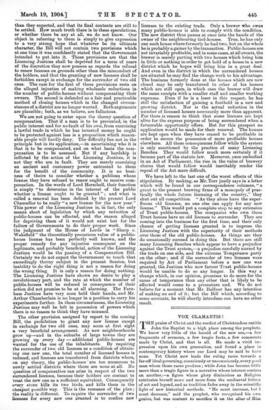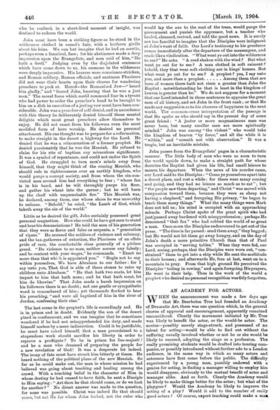VOX CLAMANT'S I
who he realised, in a short-lived moment of insight, was destined to redeem the world.
John must have been a striking figure as he stood in the wilderness clothed in camel's hair, with a leathern girdle about his loins. We can but imagine that he had an ascetic, perhaps even a fanatical, face; for his abstinence made a deep impression upon the Evangelists, and men said of him, "He bath a devil." Judging even by the disjointed sentences which have come down to us, his sermons in the wilderness were deeply impressive. His hearers were conscience-stricken, and Roman soldiery, Roman officials, and unctuous Pharisees did not wear their hearts upon their sleeves for wandering preachers to peck at. Herod—the Romanised Jew—" heard him gladly," and "feared John, knowing that he was a just man." The moral force which could command fear in a tyrant who had power to order the preacher's head to be brought to him on a dish in execution of a jesting vow must have been con- siderable. John was a preacher of self-denial, and in accordance with this theory be deliberately denied himself those mental delights which most great preachers allow themselves to enjoy. He did not exact from his followers even the most modified form of hero worship. He desired no personal attachment. His one thought was to prepare for a reformation, to make straight in the desert a highway for the Lord. He denied that he was a reincarnation of a former prophet. He denied passionately that he was the Messiah. He refused to claim for his rite of baptism any miraculous significance. It was a symbol of repentance, and could not endue the Spirit of God. He struggled to turn men's minds away from himself, that they might think of the coming Messiah, who should rule in righteousness over an earthly kingdom, who would purge a corrupt society, and from whom the sin-con- victed men around him had everything to fear ; "whose fan is in his hand, and he will throughly purge his floor, and gather his wheat into the garner ; but he will burn up the chaff with unquenchable fire." This Messiah was, he declared, among them, one whose shoes he was unworthy to unloose. "Behold," he cried, "the Lamb of God, which taketh away the sin of the world."
Little as he desired the gift. John certainly possessed great personal magnetism. How else could he have got men to stand and hear his denunciations P He told the men of his generation that they were as fierce and false as serpents, a "generation of vipers." He accused the soldiers of violence and calumny, and the tax-gatherers of extortion, the Pharisees of an effete pride of race, the comfortable class generally of a pitiless greed. "Do violence to no man, neither accuse any falsely; and be content with your wages," he commands. "Exact no more than that which is appointed you." "Begin not to say within yourselves, We have Abraham to our father : for I say unto you, That God is able of these stones to raise up children unto Abraham." "He that bath two coats, let him impart to him that bath none; and he that bath meat, let him do likewise." That John made a harsh impression on his followers there is no doubt; not one gentle or sympathetic word is remembered of him ; yet thousands flocked to hear his preaching, "and were all baptized of him in the river of Jordan, confessing their sins."
The last scene in the prophet's life is exceedingly sad. He is in prison and in doubt. Evidently the son of the desert pined in confinement, and we can imagine that he sometimes wondered if he had not misapprehended his duty, and made himself useless by a mere indiscretion. Could it be justifiable, be must have asked himself, that a man preordained to a stupendous work should sacrifice his liberty in order to reprove a profligate To be in prison for lese-majeste ! and he a man who dreamed of preparing the people for a new revelation of God! It was a desperate lot indeed. The irony of fate must have struck him bitterly at times. He heard nothing of the political plans of the new Messiah. So far as he could make out, the man in whose mission he had believed was going about teaching and healing among the crowd. With a touching belief in the character of Him in whose destiny he had ceased to have faith, he sent a Disciple to Him saying : "Art thou he that should come, or do we look for another ? " No direct answer was made to the question, for none was possible. Christ was indeed He that should come, but not He for whom John looked, not the ruler who
would lay the axe to the root of the trees, would purge the government and punish the oppressor, but a teacher who healed, cleansed, revived, and told the good news. It is surely not too fanciful to imagine that the Disciples were indignant at John's want of faith. Our Lord's testimony to his greatness comes immediately after the departure of the messengers, and reads likes vindication. "What went ye out into the wilderness to see?" He asks. "A reed shaken with the wind ? But what went ye out for to see ? A man clothed in soft raiment P behold, they that wear soft clothing are in kings' houses. But what went ye out for to see ? A prophet? yea, I say unto you, and more than a prophet Among them that are born of women there hath not risen a greater than John the Baptist : notwithstanding he that is least in the kingdom of heaven is greater than he." We do not suppose for a moment that our Lord intended in these sentences to appraise the great men of all history, and set John in the front rank ; or that He made any suggestion as to his chances of happiness in the next world. The common-sense interpretation of the passage is that He spoke as who should say in the present day of some great friend : "A juster or more magnanimous man was never born, but many smaller men are more spiritually minded." John was among "the violent" who would take the kingdom of heaven "by force," and all the while it is "within," and " cometh not with observation." It was a tragic, but an inevitable mistake.
John passes from the Evangelists' pages in a characteristic manner. The little body of men who were so soon to turn the world upside down, to make a straight path for whose doctrine the Baptist had given his life, had small leisure to mourn his departure. When the news of his murder came, our Lord said to the Disciples : "Come ye yourselves apart into a desert place, and rest a while : for there were many coming and going, and they had no leisure so much as to eat" ; but "the people saw them departing," and Christ " was moved with compassion toward them, because they were as sheep not having a shepherd," and foregoing His privacy, "he began to teach them many things." What the many things were Mark does not tell us ; his mind is occupied with an approaching miracle. Perhaps Christ spoke of the great spirit who had just;passed away burdened with misapprehension; perhaps He denounced "that fox" who had robbed the world of so great a man. Once more the Disciples endeavoured to get out of the press. "The time is far passed: send them away," they begged; but He would not let them go away hungry, and on the day of John's death a more primitive Church than that of Paul was occupied in "serving tables." When they were fed, our Lord, seeing, perhaps, that the Disciples were worn out, " con- strained " them to get into a ship while He sent the multitude to their houses; and afterwards He, free at last, went on to a mountain to pray. From that high ground He perceived the Disciples "toiling in rowing," and again foregoing Hisprayers, He went to their help. Thus in the work of the world a prophet who desired no personal recognition was fitly forgotten.











































 Previous page
Previous page